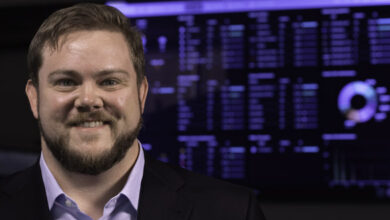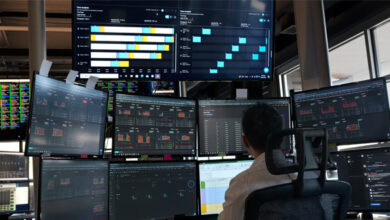Neveu returns for 2nd term as IADC Chairman with focus on advocacy, next-gen engagement
Effectively conveying the importance of oil and gas drilling will be key during transformative time for the world’s energy system
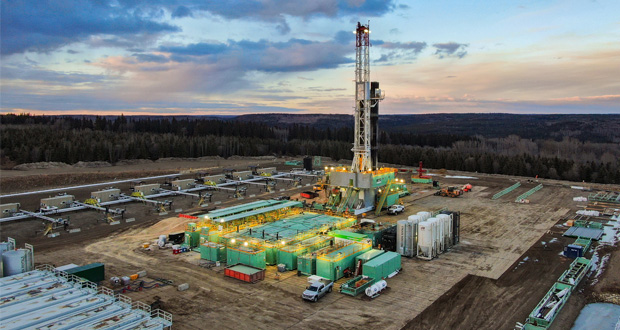
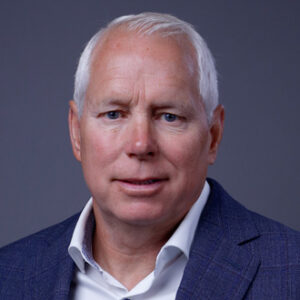
President and CEO, Precision Drilling
By Stephen Whitfield, Senior Editor
Under different circumstances, Kevin Neveu might not be returning for a second stint as IADC Chairman.
Mr Neveu already has a lot on his plate in his role as President and CEO of Precision Drilling, but he is drawn to transformational challenges and opportunities – key features of today’s energy industry. Global political realignments, changing investor sentiment and government actions to address climate change are leading governments and individuals to examine how oil and gas fit into the future energy equation.
Certain investor groups have been discouraged from investing in drilling and upstream oil and gas, while many universities and colleges have redirected engineering and science syllabuses away from hydrocarbon exploration and development. These actions have the potential to result in severely restricted energy supply when the world needs energy now more than ever.
Having voices to promote the vital role that the drilling industry plays in keeping the world running and moving toward an energy complex that is secure, abundant and with lower carbon emissions has perhaps never been as vital as it is now.
IADC serves as one of those voices, and its work advocating on behalf of the industry is critical at such a transformative time. For that reason, six years after his last go-around, Mr Neveu did not hesitate to take on the Chairman position again for 2025.
“The mission of the IADC has always been important, and it has become more important over the last few years due to crucial advocacy and public policy influence. For me, coming back and doing this job reinforces how important it is. It’s so important to have a strong coherent message and be part of the right conversations, and it’s an area where I want to dedicate more time,” he said.
Noting that “our modern world runs on energy,” he said it was important for industry organizations to emphasize the fundamental role that energy plays: “It’s a heated house, a cooled house, groceries delivered to stores or to homes. It’s planes, trains, trucks and ships. It’s the Internet. And it’s all forms of communication, information storage and data. Our modern lives require secure, affordable and abundant energy, and effectively sharing this conversation should be our top priority.”
Touting environmental achievements
Mr Neveu stressed the importance of meeting people where they are. For drilling contractors, that means addressing head-on the challenges associated with reducing carbon emissions from its operations. As he puts it, the industry must better communicate that it is “part of the solution, not the problem. It also means helping the policymakers understand and recognize this important role.”
Promoting the industry’s achievements, he pointed to Precision Drilling’s EverGreen suite of environmental technologies, which includes diesel consumption and emissions monitoring systems, hydrogen injection combustion-catalyst systems, and integrated natural gas generators that all reduce higher-emission diesel fuel consumption and operating costs.
Mr Neveu said he is optimistic that drilling contractors will continue to push ahead in the environmental space – even if the industry is only still “in the early innings” of maximizing emission-reduction technologies on the rig, like battery energy storage systems combined with natural gas fired generators or grid-powered rig engines.
“I think consumers are figuring out that the concept of battery energy storage combined with an efficient ICE (internal combustion engine) – like a hybrid car – is the most flexible automobile emissions solution, at least until better batteries are developed. Drilling rigs have a highly variable power demand that is well suited to a similar hybrid power system with battery energy storage combined with ICE generating power, perhaps an even better application than automotive.”
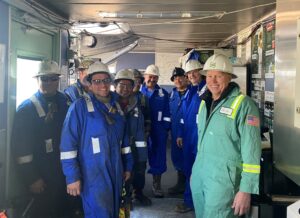
Engaging with the public
The focus on advocacy and public policy echoes one of the main themes Mr Neveu stressed upon taking over as IADC Chairman back in 2019 – at the time, he noted one of his goals was to enhance the association’s work on engaging the next generation of workers. This is still a priority for him in 2025.
Touting Precision’s work in the low-carbon space has been key to drawing recent graduates onto its team. Utilizing social media such as Instagram and TikTok to communicate the company’s progress and success with its EverGreen products has been essential to getting its message out to the next generation of people considering the oil and gas industry for a career.
“We can have a lot of impact with the people entering the workforce. They’re the new thinkers, the people that will be making decisions for the world over the coming decades. We must try to impact that group as much as we can,” he said.
IADC’s Student Chapter program has also been instrumental in helping promote the industry as a viable career path for young people entering the workforce, and Mr Neveu said he wants to see the program continue its growth. He cited the newly launched Scholarship Program, which awarded a total of $100,000 to 20 students in 2024, as an example of the kind of outreach that will provide long-lasting value to the industry.
“Every Student Chapter member that I’ve met at IADC conferences has been excited about this industry,” he said. “They want to make a difference. It’s not just about money or even a career. It’s about the opportunities in our industry. They are knowledgeable about climate change and emissions, and they understand the importance of energy security, abundance and cost, and they want to be here.”
Engaging with the wider public and policymakers – who may not have much in-depth understanding of the complexity of energy production – is a bigger challenge, Mr Neveu said, and it’s one that the industry will need to continue to evolve as it moves forward.
“The problem is that it’s difficult for the public to understand the complex engineering and infrastructure necessary to drive our energy supply systems, to ensure security of supply with affordable energy. It is difficult to create an understandable narrative for this complicated supply chain, and it’s challenging to have these kinds of conversations with the public. Conversely, it’s easy to energize the public with conversations linking oil and gas to bad weather and hot temperatures to climate change – while the counter-
argument is a complex engineering and economics discussion about energy supply networks, security and cost. We need to be better at finding a way to shift that conversation,” he said.
To this end, he said one of the best ways for IADC to reach the public is through its continued work with political leaders, particularly through its DrillersPAC political action committee.
“Our role in helping drive policy conversations is a role we’ve played for a long time, and it’s getting more and more important. IADC continues to advocate with both Democrats and Republicans, and we need to make sure the conversation is a balanced one,” he said.
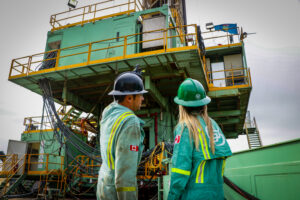
Attracting capital back into the oil and gas industry
During his first stint as IADC Chairman, Mr Neveu spoke a lot about the need for prioritizing performance and efficiency improvements in order to build sustainable businesses in a lower-price environment. Six years later, he says that focus on economic sustainability is looking to pay off.
Following a pair of significant downturns over the past decade, the industry has pushed toward an economic model that favors capital discipline, where E&Ps and service companies are prioritizing returning cash to shareholders over growth. With investors focused on financial returns, not growth, oil and gas operators have transitioned to drilling programs funded within their cash flows.
Mr Neveu said this means the industry has had to squeeze costs as hard as it can, primarily by making drilling as “efficient, predictable and repeatable” as possible.
“Compared with the prior decade when there was a lot of capital, we’re now in this model where we have to stay within cash flow and deliver sustainable returns to our investors if we hope to attract outside investment and benefit from a lower cost of capital. There is no question that this has made us a smarter, better and more efficient industry,” he said.
The big step-change that’s allowed drillers to deliver predictability and repeatability – and increased efficiency – is the adoption of automation and robotics onto the rig. Precision Drilling offers its own suite of automation and AI-based technologies called Alpha, which has helped the company optimize drilling parameter roadmaps and, subsequently, reduce drilling times.
Mr Neveu also pointed to Precision’s use of generative AI on its rig data logs to help identify common circumstances that can lead to various equipment failures – by identifying these circumstances and mitigating them, the company can help reduce nonproductive time.
Even as automation becomes more ingrained in the day-to-day functions of the rig, Mr Neveu said rig crews will continue to be as important as ever, even if their responsibilities continue to shift over time.
“It’s unlikely we’ll get to have an unmanned rig where we don’t have any people, but I believe we will remove people from most, if not all, of the high-risk positions on the drilling rig,” he said. “The faster we drill, and the more we automate, the maintenance needs increase and the maintenance becomes more sophisticated. The crew’s work and skills required are upscaling.” DC



